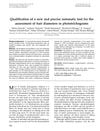 21 citations,
August 2011 in “Body Image”
21 citations,
August 2011 in “Body Image” Acceptance reduces hair loss distress and medical consultations; coping mechanisms increase them.
 15 citations,
July 2020 in “Dermatologic Therapy”
15 citations,
July 2020 in “Dermatologic Therapy” FPHL is common in women, influenced by genetics and hormones, and can be treated with medications, laser therapy, or hair transplantation.
 15 citations,
February 2017 in “International Journal of Women's Dermatology”
15 citations,
February 2017 in “International Journal of Women's Dermatology” Hair aging and loss are caused by genetics, hormones, environment, and grooming, with treatments like minoxidil effective for certain types of hair loss.
 13 citations,
June 2020 in “Journal of Dermatological Treatment”
13 citations,
June 2020 in “Journal of Dermatological Treatment” Topical finasteride helps regrow hair and reduce hair loss in men and women.
 11 citations,
January 2001 in “Cambridge University Press eBooks”
11 citations,
January 2001 in “Cambridge University Press eBooks” Androgens can cause hair growth in some areas but hair loss on the scalp.
 10 citations,
September 2020 in “Archives of Dermatological Research”
10 citations,
September 2020 in “Archives of Dermatological Research” Both methods improve hair density and thickness; double-spin may be more effective.
 9 citations,
January 2011 in “Skin Research and Technology”
9 citations,
January 2011 in “Skin Research and Technology” The new automatic tool accurately measures hair thickness and is reliable.
 8 citations,
May 2021 in “Bioengineering & translational medicine”
8 citations,
May 2021 in “Bioengineering & translational medicine” Hair growth environment recreated with challenges; stem cells make successful skin organoids.
 6 citations,
October 2015 in “International Journal of Women's Dermatology”
6 citations,
October 2015 in “International Journal of Women's Dermatology” Hair aging is inevitable, but using the right hair care products can help maintain hair health.
 6 citations,
October 2000 in “International Journal of Dermatology”
6 citations,
October 2000 in “International Journal of Dermatology” Preventing hair loss is more effective than regrowth; oral finasteride is a realistic option.
 5 citations,
January 2021 in “Skin appendage disorders”
5 citations,
January 2021 in “Skin appendage disorders” Smoking is linked to more hair loss and premature graying compared to nonsmokers.
 5 citations,
September 2020 in “Journal of Cosmetic Dermatology”
5 citations,
September 2020 in “Journal of Cosmetic Dermatology” Dexpanthenol improves hair growth and satisfaction in women without side effects.
 4 citations,
March 2019 in “Experimental Biology and Medicine”
4 citations,
March 2019 in “Experimental Biology and Medicine” Exposure to 50 Hz electromagnetic fields may help mice grow hair faster.
 2 citations,
October 2015 in “Primary Care: Clinics in Office Practice”
2 citations,
October 2015 in “Primary Care: Clinics in Office Practice” Doctors should diagnose hair loss by examining the patient and possibly doing tests, and then treat it based on the type, which may prevent permanent hair loss.
 1 citations,
January 2021 in “Dermatological reviews”
1 citations,
January 2021 in “Dermatological reviews” Hair transplantation improves androgenetic alopecia with high patient satisfaction.
 1 citations,
January 2001
1 citations,
January 2001 Micrografting is the most effective surgical method for permanent hair restoration.
 June 2024 in “Frontiers in pharmacology”
June 2024 in “Frontiers in pharmacology” 2-deoxy-D-ribose gel may help regrow hair in cases of hair loss.
 March 2024 in “Buletin de psihiatrie integrativă (Print)”
March 2024 in “Buletin de psihiatrie integrativă (Print)” Hair loss from telogen effluvium can cause mental health issues and lower life quality, needing both medical and emotional support.
 November 2023 in “Frontiers in cell and developmental biology”
November 2023 in “Frontiers in cell and developmental biology” Hair aging is caused by stress, hormones, inflammation, and DNA damage affecting hair growth and color.

Researchers found a genetic link for hereditary hair loss but need more analysis to identify the exact gene.
 December 2020 in “International journal of research in ayurveda and pharmacy”
December 2020 in “International journal of research in ayurveda and pharmacy” Eating well and avoiding synthetic hair products are key for healthy hair.

Hair loss causes emotional distress, leading to high spending on treatments, with Minoxidil and Propecia being common but having side effects.
 September 2010 in “Advances in Dermatology and Allergology/Postępy Dermatologii i Alergologii”
September 2010 in “Advances in Dermatology and Allergology/Postępy Dermatologii i Alergologii” TrichoScan is reliable for counting and measuring hair density but may not accurately assess hair types in women with hair loss.
 242 citations,
February 2016 in “Science”
242 citations,
February 2016 in “Science” Hair loss and aging are caused by the breakdown of a key protein in hair stem cells.
 143 citations,
October 1996 in “Dermatologic Clinics”
143 citations,
October 1996 in “Dermatologic Clinics” Too much androgen can cause hair loss; finasteride may help.
 136 citations,
May 2019 in “Cells”
136 citations,
May 2019 in “Cells” Stem cell therapy, particularly using certain types of cells, shows promise for treating hair loss by stimulating hair growth and development, but more extensive trials are needed to confirm these findings.
 118 citations,
April 1998 in “Dermatologic Clinics”
118 citations,
April 1998 in “Dermatologic Clinics” Finasteride and minoxidil are effective for hair regrowth, while treatments for alopecia areata have varying success and continuous treatment is necessary.
 106 citations,
March 2014 in “BioEssays”
106 citations,
March 2014 in “BioEssays” We need more research to better understand human hair follicle stem cells for improved treatments for hair loss and skin cancer.
 95 citations,
May 2012 in “British Journal of Dermatology”
95 citations,
May 2012 in “British Journal of Dermatology” Androgens block hair growth by disrupting cell signals; targeting GSK-3 may help treat hair loss.
 87 citations,
March 2011 in “Australasian Journal of Dermatology”
87 citations,
March 2011 in “Australasian Journal of Dermatology” Genetics and hormones play a role in male and female hair loss, but more research is needed to fully understand it.






























